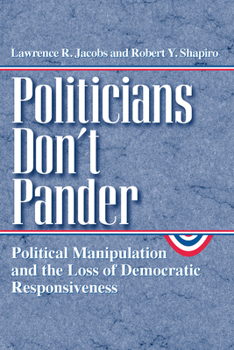Politicians Don't Pander: Political Manipulation and the Loss of Democratic Responsiveness
(Part of the Studies in Communication, Media, and Public Opinion Series)
Select Format
Select Condition 
Book Overview
Public opinion polls are everywhere. Journalists report their results without hesitation, and political activists of all kinds spend millions of dollars on them, fueling the widespread assumption that elected officials "pander" to public opinion--that they tailor their policy decisions to the results of polls. In this provocative and engagingly written book, the authors argue that the reality is quite the opposite. In fact, when not facing election, contemporary presidents and members of Congress routinely ignore the public's policy preferences and follow their own political philosophies, as well as those of their party's activists, their contributors, and their interest group allies. Politicians devote substantial time, effort, and money to tracking public opinion, not for the purposes of policymaking, but to change public opinion--to determine how to craft their public statements and actions to win support for the policies they and their supporters want. Taking two recent, dramatic episodes--President Clinton's failed health care reform campaign, and Newt Gingrich's "Contract with America"--as examples, the authors show how both used public opinion research and the media to change the public's mind. Such orchestrated displays help explain the media's preoccupation with political conflict and strategy and, the authors argue, have propelled levels of public distrust and fear of government to record highs. Revisiting the fundamental premises of representative democracy, this accessible book asks us to reexamine whether our government really responds to the broad public or to the narrower interests and values of certain groups. And with the 2000 campaign season heating up, Politicians Don't Pander could not be more timely. "'Polling has turned leaders into followers, ' laments columnist Marueen Dowd of The New York Times. Well, that's news definitely not fit to print say two academics who have examined the polls and the legislative records of recent presidents to see just how responsive chief executives are to the polls. Their conclusion: not much. . . . In fact, their review and analyses found that public opinion polls on policy appear to have increasingly less, not more, influence on government policies."--Richard Morin, The Washington Post
Format:Paperback
Language:English
ISBN:0226389839
ISBN13:9780226389837
Release Date:June 2000
Publisher:University of Chicago Press
Length:448 Pages
Weight:1.36 lbs.
Dimensions:0.9" x 6.0" x 8.9"
Customer Reviews
1 rating
Terrific: Explores Link Betwn Public Opinion & Politicians
Published by Thriftbooks.com User , 23 years ago
This is a wide-ranging, theoretically rich and empirically focused look at whether politicians simply "follow" the polls or whether politicians use polls to help "sell" proposals to the public. The answer is both, of course, but Jacobs and Shapiro explain how and why public leaders develop their own policy views, and how the public's acceptance of those views shape how policies are ultimately formed. Politicians are "trustees" in the Burkean sense, but how they explain their actions have to be placed in a "delegate" framework. Their case study on health care policy is especially instructive. This book won the 2001 Goldsmith Book Prize, it should be read by serious students of the media and politics.






